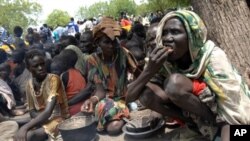A leading member of a youth organization in Rumbek State says southern Sudanese youth were deprived of education during the civil war between President Omar Hassan Al-Bashir’s government and the Sudan People’s Liberation Movement (SPLM).
Mathok Madol Mathok says improved access to education should be an important part of the region’s recovery.
“The neediest thing as a citizen of southern Sudan and also as a youth at the same time is education. During the war, many of us didn’t go to school because the youth were also at war…so we did not get time to study. After the war, we need education to develop our country,” he said.
Some studies conclude that after the 2005 Comprehensive Peace Agreement development efforts have failed to materialize for the Nuer, Dinka, Murle and other communities.
Mathok said both factions deployed a lot of young people during the civil war. Today, youth are often engaged in violent attacks and counter-attacks with other communities.
According to a recent USAID report, the people of southern Sudan and the areas of Abyei, Blue Nile, and Southern Kordofan have some of the lowest literacy rates in the world.
The report also stated that public opinion polls show a high demand for education services.
The Government of Southern Sudan says some of its ministries are working closely with the USAID to build human and institutional capacity to implement and administer decentralized education services.





